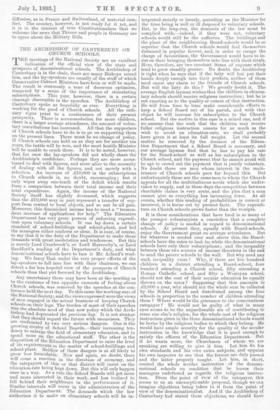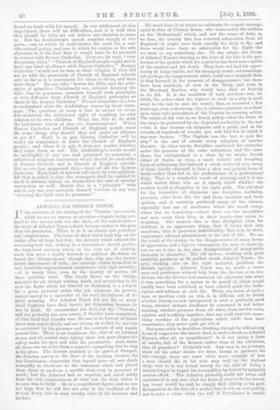THE ARCHBISHOP OF CANTERBURY ON CHURCH SCHOOLS. T HE meetings of
the National Society are an excellent indication of . the official view of the state and prospects of denominational schools. The Archbishop of Canterbury is in the chair, there are many Bishops round him, and the lay-speakers are usually of the stuff of which Conservative Cabinet Ministers have been or will be made. The result is commonly a tone of decorous optimism, tempered. by a sense of the importance of stimulating subscriptions. This year, however, there is a certain cleavage discernible in the speeches. The Archbishop of Canterbury spoke as hopefully as ever. Everything is working for the good of Church schools. All the ordi- nary signs point to a continuance of their present prosperity. There is accommodation for more children, i there s a larger average attendance, the amount of volun- tary contributions has increased. All that the supporters of Church schools have to do is to go on supporting them on the present lines. There must be no change of policy. If Church schools can hold on as they are for another ten years, the battle will be won, and the most hostile Minister will be unable to crush them. It is to be noted, however, that for once the lay-speakers did not wholly share the Archbishop's confidence. Perhaps they are more accus- tomed to deal with figures, and more alive to the necessity of dealing with all the figures, and not merely with a selection. An increase of £10,000 in the subscriptions to Church schools is, no doubt, encouraging ; but it only wipes away one-tenth of the deficit which results from a comparison between their total income and their total expenditure. Again, the income of the National Society itself has slightly decreased, which suggests that the £10,000 may in part represent a transfer of sup- port from central to local objects, and so not be all gain. Moreover, this diminished income has to meet a "tremen- dous increase of applications for help." The Education Department has very great powers of enforcing expendi- ture upon voluntary schools. It can lay down a certain standard of school-buildings and school-plant, and bid the managers either conform or close.. It is easy, of course, to say that it is the duty of the Department to make these demands with great moderation and tenderness. But this is merely Lord Cranbrook's, or Lora Ffarrowby's, or Lord Sandford's reading of the Department's duty, and what denominational schools have to face is Mr. Acland's read- ing. We fancy that, under the very proper efforts of the lay-speakers to fall into line with their chairman, we can detect a far less hopeful view of the prospects of Church schools than that put forward by the Archbishop.
Any uncertainty there may have been at the meeting as to the existence of two opposite currents of feeling about Church schools, was removed 17 the speeches at the con- ference held the next day. To this came the working oars of the National Society; and. the views expressed were the views of men engaged in the actual business of keeping Church schools on their legs. The burden of most of their speeches was the absolute need of that new policy which the Arch- bishop had deprecated the previous day. It is not strange that they should regard the future with uneasiness. They are confronted by two very serious dangers. One is the growing rivalry of School Boards,—their increasing ten- dency to enlarge the field of elementary education, and to spend. more on the educational staff. The other is the disposition of the Education Department to raise the level of its requirements in the matter of school-buildings and school-plant. Neither of these dangers is at all likely to grow less formidable. Now and again, no doubt, there will come a reaction in the direction of economy, and the ratepayers of this or that district will insist on the education-rate being kept down. But this will only happen once in a way. As a rule the School Boards will get more and more interested. in their work, and less inclined to fall behind their neighbours in the performance of it. Similar intervals will occur in the administration of the Education Department. The demands which the law authorises it to make on elementary schools will be in- terpreted strictly or loosely, according as the Minister for the time being is well or ill disposed to voluntary schools. But, in the long-run, the demands of the law must be complied with,—indeed, if they were not, voluntary schools would. still be the sufferers. The buildings and the plant of the neighbouring Board-schools would be so superior that the Church schools would find themselves distanced in popular favour, and, in order to escape the charge of favouritism, the Government would have to in- sist on their bringing themselves into line with their rivals. Here, therefore, are two constant items of expense which tend to grow steadily greater. No doubt the Archbishop is right when he says that if the laity will but put their hands deeply enough into their pockets, neither of them need cause any alarm to the friends of Church schools. But will the laity do this ? We greatly doubt it. The average English layman wishes that the children in elemen- tary schools should receive religious instruction ; but he is not exacting as to the quality or extent of that instruction. He will from time to time make considerable efforts to keep a School Board out of his parish, and with that object he will increase his subscription to the Church school. But the motive in this case is a mixed one, and if we assume that the wish that the children may receive fuller religious instruction counts for as much as the wish to avoid an education-rate, we shall probably have given it at least its full weight. Let the second motive be removed by the decision of the Educa- tion Department that a School Board is necessary, and our average layman find that he has to pay his rate for the Board-school as well as his subscription to the Church school, and the payment that he cannot avoid will be apt to crowd out the payment that is purely voluntary. No doubt there are men whose interest in the main- tenance of Church schools goes far beyond this. But unfortunately these are the same men to whom the Church appeals for all the multitudinous needs which she under- takes to supply, and in these days the competition between charitable claims is very acute, and the plea that a man cannot give to everything has increasing force. At all events, whether this reading of probabilities is correct or incorrect, it is borne out by present facts. The expendi- tura on Church schools grows faster than the receipts.
It is these considerations that have bred in so many of the younger voluntaryists a conviction that a complete change of policy is needed in regard to denominational schools. At present they, equally with Board-schools, enjoy the Government grant on average attendance. But for whatever is needed over and above this, the Board- schools have the rates to look to, while the denominational schools have only their subscriptions; and the inequality between these two sources of income threatens in the end to send the poorer schools to the wall. But why need any such inequality exist ? Why, if there are five hundred children in a district attending a Board-school, four hundred attending a Church school, fifty attending a Roman Catholic school, and fifty a Wesleyan school, should not the cost of their secular education be equally thrown on the rates ? Supposing that this amounts to £2,000 a year, why should not the whole sum be collected by the School Board and distributed among the four schools in proportion to the number of children attending them ? Where would be the grievance to the conscientious ratepayer ? He would not be guilty of what in many eyes seems to be the unpardonable sin of contributing to some one else's religion, for the whole cost of the religious instruction given in the three denominational schools would be borne by the religious bodies to which they belong. He would have ample security for the quality of the secular instruction in the knowledge that it is good enough to satisfy the officers of the Education Department. But if he wants more, the Churchmen of whom we are speaking are willing to give it him. Let him fix his own standards and his own extra subjects, and appoint his own inspector to see that the former are duly passed and the latter properly taught. Lot him, in short, control the whole secular instruction of the denomi- national schools on condition that he leaves their managers unfettered as regards the religious instruc- tion. From the point of view of the ratepayer, this seems to us an unexceptionable proposal, though we can imagine objections being taken to it from the point of view of the denominationalist. And if the Archbishop of Canterbury had stated these objections, we should have found no fault with his speech. In any settlement of this importance, there will be difficulties, and it is well that they should be fully set out before any decision is come to. But the Archbishop's speech consists simply of two parts,—one in which he understates the need for a new educational policy, and one in which he assigns as his sole objection to it the fact that it would have to be pursued in concert with Roman Catholics. They are, he says, "very dangerous allies." "Church of England people ought not to have any kind of alliance with Roman Catholics." Roman Catholics "would not be true to their religion if they did not go with the promoters of Church of England schools only so far as it is convenient for them to do so, and then leave them." No one who "knows his Bible and the prin- eiples of primitive Christianity can, without denying the bight that he possesses, associate himself with principles so very different from Church of England principles as those of the Roman Catholics." •We are altogether at a loss to understand what the Archbishop means by these warn- ings. The question at issue is how to secure to every denomination the unfettered right of teaching its own religion to its own children. What has this to do with the particular tenets of any one denomination ? When Roman Catholics and Church of England people want the same thing, why should they not make an alliance to get it ? Until it is got, Roman Catholics will be under no temptation to leave the Church of England people ; and when it is got, it does not matter whether they leave them or not. The Archbishop's words would be intelligible if any one had proposed to construct a syllabus of religious instruction which should be used alike in Roman Catholic and in Church of England schools.
, But no one has suggested this,—least of all the Roman Catholics. Each kind of schools will have its own syllabus. All that is asked is that the managers shall be enabled to teach it without taking on themselves the cost of secular instruction as well. Surely this is a " principle " with • which any one may associate himself without in any way "denying the light that he possesses."











































 Previous page
Previous page